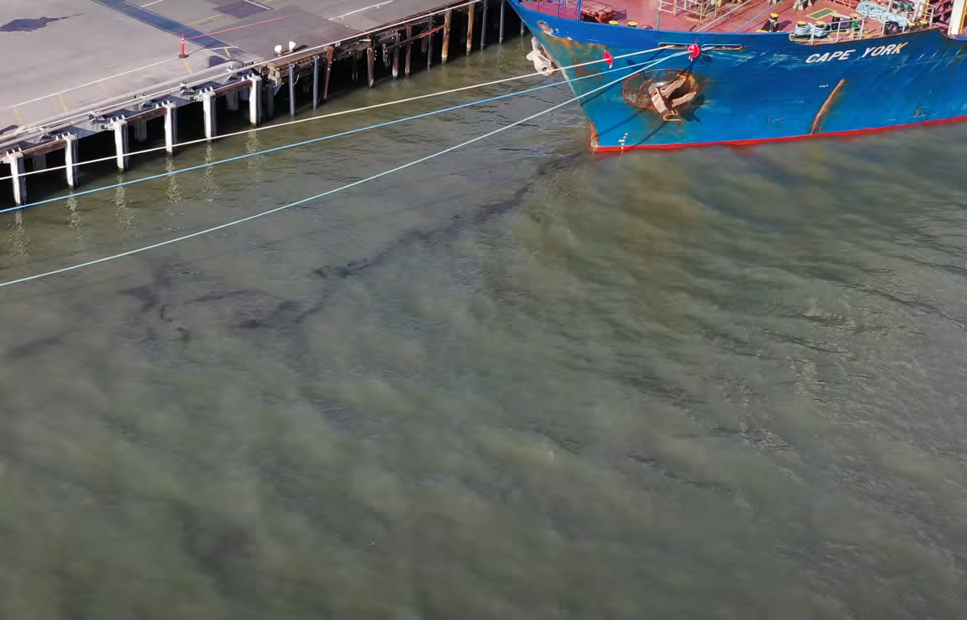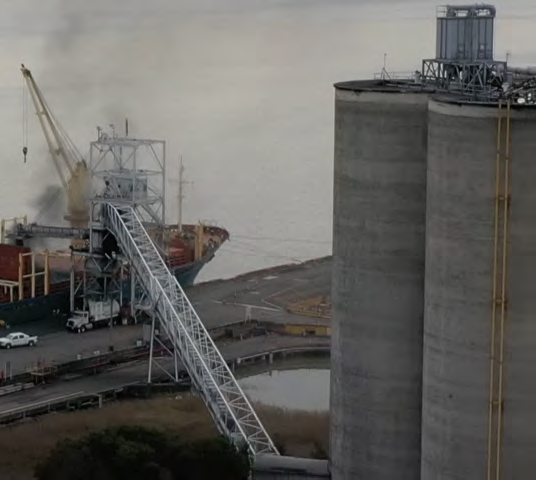[BenIndy: This win shows why Benicia residents are demanding local oversight through the enactment of an Industrial Safety Ordinance (ISO). While we’re grateful to Baykeeper for taking a stand for our health and safety, we shouldn’t have to rely on nonprofits for protection. Nor should we accept City leaders’ seeming reluctance to rock the boat in a refinery town by supporting an ISO. The polluted waters this metaphorical boat now floats on demonstrate that inaction and waffling in our leadership is as risky as industrial pollution. It’s time for Benicia’s leaders to pick up their oars and navigate us all to safer, cleaner shores—even if it means making waves.]
Valero and Amports Agree to Clean up Their Acts

Baykeeper’s 300th Legal Win: Hard Evidence Holds Polluters Accountable
Baykeeper, October 7, 2024
After four years of drone investigations, rigorous evidence collection, and court filings: We won! Valero and Amports—the two companies operating an export terminal at the Port of Benicia—have agreed to stop polluting the Bay and nearby neighborhoods. What’s more, this settlement officially marks Baykeeper’s 300th legal victory over 35 years, and it includes the largest Clean Water Act mitigation payment in our history.
It all started with a report to Baykeeper’s pollution hotline. The tipster let us know that the companies were spilling some dark material into the water while loading cargo ships at the port.
When our field team investigated, we documented long black plumes of petroleum coke drifting out into the Bay. We also recorded clouds of petcoke dust rising off the conveyor belts, fouling the air and threatening people in nearby neighborhoods.
Companies Commit to Cleaner Operations
Valero and Amports have agreed to make significant infrastructure upgrades and operational changes to improve activities at the site. These changes will include thorough cleaning and maintenance, installing state-of-the-art equipment to prevent spills and aerial drift, as well as monitoring and recording all petcoke loading operations. Baykeeper’s experts will be evaluating the companies’ compliance with the agreement over the next three years to ensure they are no longer polluting.
$2.38 Million for Local Nonprofits
The companies have also agreed to pay $2.38 million in environmental mitigation payments to help offset the harm of their past pollution. They will send the payment to our partners at the Rose Foundation for Communities and the Environment, which will re-grant it to non-profit organizations around the Bay Area to fund projects that benefit the health of the San Francisco Bay-Delta watershed. None of these grants will go to Baykeeper.
With this latest pollution settlement, Baykeeper has directed more than $15 million to the community over our 35-year history. Those funds have supported hundreds of Bay-focused environmental initiatives.
“Baykeeper stood up to these two big companies and made them clean up their acts,” said Baykeeper executive director Sejal Choksi-Chugh. “It’s a big win for the Bay and the people around Benicia. It makes me proud to know that there will be less toxic pollution harming the community, and that lots of local grassroots nonprofits will get a big funding boost to support projects like creek cleanups, wetlands restoration, and environmental education programs because of our win.”
This victory was made possible because of our dedicated supporters. Thank you for enabling us to hold this major fossil fuel polluter accountable, defend local communities, and protect San Francisco Bay.
Make a gift today to keep Baykeeper’s team on the water and in the courtroom.
With your support, we’ll keep taking on the Bay’s biggest polluters – and winning!
Previous reporting by BenIndy:
By Roger Straw, October 6, 2021
[See also: Video and photos at Port of Benicia show fossil fuel polluter in the act; Marilyn Bardet – Petcoke pollution in Benicia, photos going back to 1995; Cracking Down on Refinery Emissions – all about “cat crackers”]
Summary and Details of the Pollution Lawsuit

In a previous post, I shared the Baykeeper press release announcing the photo and video evidence of illegal polluting of the Carquinez Strait and San Francisco Bay by Benicia AMPORTS.
Here, I want to highlight the discoveries outlined in the 20-page legal notice issued by Baykeepers.
You may jump to the following sections below:
Summary and notice of 60 days to settle
Re: Notice of Ongoing Violations and Intent to File a “Citizen Suit” Under the Clean Water Act
To Whom It May Concern:
I am writing on behalf of San Francisco Baykeeper (“Baykeeper”) regarding violations of the Clean Water Act1 (“CWA” or “Act”) at the Amports Port of Benicia Terminal, owned and operated by Amports, Inc. (“Amports”) at 1997 Elm Road, Benicia, CA 94510 (“Facility”) and 1007 Bayshore Road, Benicia, CA 94510. The purpose of this letter (“Notice Letter”) is to put Amports on notice that, at the expiration of sixty (60) days from the date the Notice Letter is served, Baykeeper intends to file a “citizen suit” action against Amports in U.S. Federal District Court. The civil action will allege significant, ongoing, and continuous violations of the Act and California’s General Industrial Storm Water Permit2 (“General Permit”) at the Facility, including but not limited to, the direct deposition of petroleum coke (“petcoke”) into the water from the conveyance system, equipment, and ship, aerial deposition of petcoke directly to the water from the deck of the ship, and the uncontrolled discharge of polluted storm water to the Carquinez Strait, a part of the San Francisco Bay.
Detailed list of violations
As described in detail below, Amports is liable for ongoing violations of the Act as a consequence of the Facility’s: (1) direct discharge of petcoke into the Carquinez Strait, both through deck washing and direct aerial deposition; (2) inaccurate use of SIC code designations to avoid coverage for regulated industrial activities under the General Permit; (3) failure to comply with the terms and conditions of the General Permit resulting in unpermitted storm water discharges, including but not limited to the preparation and implementation of a proper Storm Water Pollution Prevention Plan related to Amports’ petcoke loading operation, preparation and implementation of a Monitoring Implementation Plan, and compliance with technology-based Effluent Limitations.
60-day notice and offer of settlement
CWA section 505(b) requires that sixty (60) days prior to the initiation of a civil action under CWA section 505(a), a citizen must give notice of their intent to file suit. 33 U.S.C. § 1365(b). Notice must be given to the alleged violator, the U.S. Environmental Protection Agency (EPA), and the State in which the violations occur. As required by section 505(b), this Notice of Violation and Intent to File Suit provides notice to Amports of the violations that have occurred and which continue to occur at the Facility. After the expiration of sixty (60) days from the date of this Notice of Violation and Intent to File Suit, Baykeeper intends to file suit in federal court against Amports under CWA section 505(a) for the violations described more fully below.
During the 60-day notice period, Baykeeper would like to discuss effective remedies for the violations noticed in this letter. We suggest that you contact us as soon as possible so that these discussions may be completed by the conclusion of the 60-day notice period. Please note that it is our policy to file a complaint in federal court as soon as the notice period ends, even if discussions are in progress.
Background and photos
A. San Francisco Baykeeper
San Francisco Baykeeper (“Baykeeper”) is a non-profit public benefit corporation….
Members of Baykeeper reside in Benicia, California, as well as in many of the surrounding communities. Baykeeper’s members and supporters use and enjoy San Francisco Bay and other waters for various recreational, educational, and spiritual purposes. Baykeeper’s members’ use and enjoyment of these waters are negatively affected by the pollution caused by the Facility’s operations….
B. The Owner and/or Operator of the Facility
Amports, Inc. is a dba of APS West Coast Inc. and is identified as the owner and operator of the Benicia Port Terminal Company. All three entities have the same address, CEO, Secretary, CFO, and Controller.
C. The Facility’s Industrial Activities and Discharges of Petcoke and Other Pollutants
The Facility is a roughly 400-acre site which includes marine cargo loading equipment, the petcoke loading equipment and conveyor system, parking for cars, docking area and equipment for ships, silos to store petcoke, train car petcoke offloading area and equipment, vehicle maintenance, equipment cleaning, ship cleaning, ship maintenance, and other facilities. According to Amports’ 2015 Notice of Intent to comply with the General Permit under the Clean Water Act, at least 8 acres at the Facility consisted of areas that were exposed to storm water.
The Valero Benicia Refinery processes crude oil by separating it into a range of hydrocarbon components or fractions. Petroleum fractions include heavy oils and residual materials used to make asphalt or petcoke, mid-range materials such as diesel (heating oil), jet fuel, and gasoline, and lighter products, such as butane, propane, and fuel gases.
The petcoke is transported via rail to the Facility and is stored there in silos. Amports transfers the petcoke from the silos to a ship’s hold at the Facility’s dock by way of a covered conveyor system. During this process, the petcoke may escape in half a dozen or more ways.
First, petcoke spills off of the conveyor belt system and is deposited onto the wharf and directly into Carquinez Strait. This occurs while the crane boom is in the lowered position, and, as depicted below, continues as the boom is raised while the conveyor continues to operate.

Second, petcoke is deposited onto the deck of the ship and into the water, potentially due to overspray from the loading mechanism or other operations, leaving visible plumes of petcoke that can be seen in the water.

Third, at the conclusion of the loading, longshoremen hose off the deck of the ship, and the related loading equipment on and around the ship, cleaning the equipment and forcing contaminated runoff directly into the Carquinez Strait, again leaving visible plumes of petcoke that can be seen in the water.

Fourth, as the ship is being loaded, large visible clouds of black particulate matter, presumably petcoke dust, drift through the air away from the ship before being directly deposited into the water and/or onto the nearby shoreline.
Additionally, petcoke may escape and be deposited onto the Facility or into the water during: (a) the offload from trains, (b) the movement of petcoke around the Facility, (c) storage at the Facility, (d) from equipment and vehicle cleaning, (e) from equipment and vehicle maintenance or repair, and (f) each time a sufficient rain event occurs due to the Facility’s discharge of pollutants from industrial activity in storm water, through direct discharges of industrial pollutants.
The deposition of petcoke and other pollutants into San Francisco Bay is harmful and deleterious to the Bay’s wildlife and communities. Petcoke is a petroleum byproduct and is known to contain pollutants including heavy metals such as copper, zinc, nickel, arsenic, mercury, and vanadium, all of which are harmful to aquatic life, including fish and birds.
Additionally, people exposed to petcoke pollutants can experience severe health problems like asthma, lung cancer, and heart disease.
Detailed harmful effects of Petcoke
The deposition of petcoke and other pollutants into San Francisco Bay is harmful and deleterious to the Bay’s wildlife and communities. Petcoke is a petroleum byproduct and is known to contain pollutants including heavy metals such as copper, zinc, nickel, arsenic, mercury, and vanadium, all of which are harmful to aquatic life, including fish and birds. Additionally, people exposed to petcoke pollutants can experience severe health problems like asthma, lung cancer, and heart disease.
Amports is permitted by the Bay Area Air Quality Management District (BAAQMD) to process and load 2 million tons of petcoke onto export ships over a 12-month period. Amports does not have any permits from the San Francisco Bay Regional Water Quality Control Board (“Regional Board”). Amports is not permitted to discharge petcoke directly into the Carquinez Strait. And Amports is also not permitted to discharge any storm water, directly or indirectly, that is the result of industrial activity, including water that is commingled with industrial discharges.
Baykeeper’s suit will allege that petcoke is deposited on the site with every instance of: petcoke being transported by rail to the site, petcoke offloading from a train at the Facility, and petcoke being handled and transported on the Facility’s premises. Additionally, Baykeeper will allege that petcoke enters the Carquinez Strait with every instance of: petcoke being loaded and/or oversprayed onto a ship docked at the Facility, petcoke-related equipment, including the conveyor systems, cranes, and ships, being maintained and/or cleaned, and each storm event at the Facility in excess of 0.1” of precipitation.
The discharge of pollutants from industrial facilities contributes to the impairment of surface waters and aquatic-dependent wildlife. These contaminated discharges can and must be controlled for ecosystems to regain their health and to protect public health. As part of its investigation of the Facility, Baykeeper observed and documented by video numerous instances of illegal discharges during Amports’ various activities and handling of marine cargo (specifically petcoke) at the Facility between November 2020 and March 2021.
Additionally, with every significant rainfall event, millions of gallons of polluted storm water originating from industrial operations such as the Facility pour into storm drains and local waterways. The consensus among agencies and water quality specialists is that storm water pollution accounts for more than half of the total pollution entering surface waters each year. Such discharges of pollutants from industrial facilities contribute to the impairment of downstream waters and aquatic dependent wildlife. These contaminated discharges can and must be controlled for the ecosystem to regain its health.

THE REMAINDER OF THE DOCUMENT is organized into the following sections, which you can study at length here.
II. THE CLEAN WATER ACT (p. 7)
![]() A. The NPDES Permit Program (p. 7)
A. The NPDES Permit Program (p. 7)
![]() B. California’s General Industrial Storm Water Permit (p. 8)
B. California’s General Industrial Storm Water Permit (p. 8)
![]() C. The Facility’s Permit Enrollment Status (p. 12)
C. The Facility’s Permit Enrollment Status (p. 12)
III. NAME AND ADDRESS OF NOTICING PARTY (p. 13)
IV. COUNSEL (p. 13)
V. VIOLATIONS OF THE ACT AND GENERAL PERMIT (p. 13)
![]() A. Amports’ Direct, Non-Storm Water Discharges Without an
A. Amports’ Direct, Non-Storm Water Discharges Without an
![]()
![]() NPDES Permit (p. 14)
NPDES Permit (p. 14)
![]() B. Amports’ Illegal Indirect Discharges Without An NPDES
B. Amports’ Illegal Indirect Discharges Without An NPDES
![]()
![]() Permit (p. 15)
Permit (p. 15)
![]() C. Amports’ Illegal Storm Water Discharges (p. 15)
C. Amports’ Illegal Storm Water Discharges (p. 15)
![]() D. Violations of the Act and General Permit Reporting and
D. Violations of the Act and General Permit Reporting and
![]()
![]() Monitoring Rules (p. 16)
Monitoring Rules (p. 16)
![]() E. Violations of the General Permit’s SWPPP Requirements (p.
E. Violations of the General Permit’s SWPPP Requirements (p.
![]()
![]() 17)
17)
VI. RELIEF SOUGHT FOR VIOLATIONS OF THE CLEAN WATER
![]() ACT (p. 17)
ACT (p. 17)
VII. CONCLUSION (p. 18)
ATTACHMENT 1: DATES OF ALLEGED EXCEEDANCES BY
![]() AMPORTS FROM OCTOBER 4, 2016 TO OCTOBER 4, 2021
AMPORTS FROM OCTOBER 4, 2016 TO OCTOBER 4, 2021
![]() (p. 19)
(p. 19)
ATTACHMENT 2: SERVICE LIST (p. 20)







You must be logged in to post a comment.